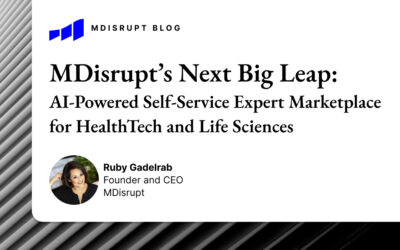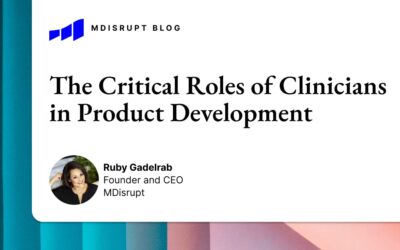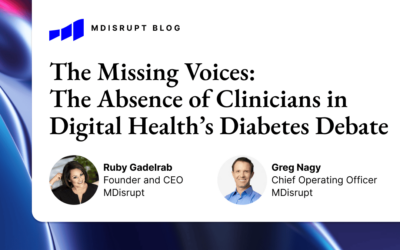
MDisrupt CEO and founder Ruby Gadelrab on how more inclusive genetic databases can reduce health disparities and bring precision medicine to everyone.
The precision medicine problem no one talks about
Precision medicine has long been a promise of the The Human Genome Project (HGP). Humans are 99.9% genetically similar, but it is the 0.1% difference that holds the key to the causes and potential cures of our diseases. The goal of the HGP was that by building genetic databases large enough to allow scientists to see the patterns and variations in the 0.1% difference in our genetics, we could give healthcare providers “immense new powers to treat, prevent, and cure disease” through precision medicine (pharmacogenetics, cancer screening and diagnostics, and much more). However, nearly 20 years later, this promise of better diagnostics and personalized therapeutics is only a reality for those of European descent. That’s because most of the world’s genetic databases consist primarily of genomes from people of European descent – and yet we know that individuals of other ancestries suffer from certain genetic diseases at a much higher prevalence.
So, how did we get here?
3 reasons genetic databases are biased
First, the genome studies conducted that led to building the first genetic databases, the genome-wide association studies (GWAS) were done in the United States and, to a lesser extent, in Europe. A 2009 analysis of the GWAS studies showed that 96% of participants were of European descent.
Second, recruitment of participants in scientific research is notoriously difficult. The faster researchers recruit, enroll, and consent participants, the faster they get the data and can publish. Participants in the GWAS studies were mostly volunteers who lived near well-funded academic institutions, and who had the motivation and the means to travel to those institutions. This resulted in the study populations not being representative of the diversity of the US population. Very few institutions tried or were able to build trust with underserved and underrepresented populations in order to successfully enroll them in the studies. The majority of the studies were conducted by scientists who identified as white. In fact, according to the National Institutes of Health (NIH), only 7% of all NIH R01 Grants were awarded to Black American and Latinx scientists.
During the GWAS era, I worked as the head of international marketing for Affymetrix (now Thermo Fisher Scientific). Affymetrix was a leading manufacturer of microarrays, the technology used to conduct GWAS research. Even back then, we were concerned about the European bias in genetic studies, so my team and I spent 2009 to 2012 traveling around the world meeting with ministers of health and major research institutions, encouraging them to fund and build genetic databases representative of their own populations. Some of these initiatives did eventually take off—notable examples include The Saudi Genome Program, H3Africa and the China Genome Project.
Third, over the last five years, new types of genetic databases emerged from the private sector. More than 26 million people purchased direct-to-consumer genetic tests. While these products have done wonders for accessibility of genetic information, they are also cost-prohibitive for underserved populations and sold by companies that are primarily US-based. This has resulted in new genetic mega-databases that, once again, are biased to people of European descent.
Private sector solutions
Individuals of African descent are highly underrepresented in genetic databases and yet genetic diversity in Africa is higher than any other region in the world. What’s more, African populations have the highest burden of disease due to Africa’s complex population history; large variations in diet; climate; and elevated exposure to infectious disease.
To their credit, some private sector genetic testing companies have tried to address this gaping disparity in genetic databases.
23andMe had the right idea and tried to address the problem through The African Genetics Project, which sought to recruit and provide detailed ancestry results to 23andMe customers of African descent.
The Nigeria-based company 54Gene is also seeking to equalize precision medicine by creating the world’s largest biobank of African genomes, which will be used to build the next generation of diagnostics and therapeutics.
Even so, we have made only marginal improvements in the diversity of our genetic databases. In 2020, a study conducted under the H3Africa Consortium showed that sequencing 426 individuals from 13 African countries resulted in the discovery of over three million novel genetic variants. This implies that we haven’t even scratched the surface of discovering the clinically important variants from those of African and other non-European descent.
5 ways to address health disparities in precision medicine
So what can be done to address the critical issue of underrepresentation in genetic databases? Here are the key areas that I believe will lead to change:
1. Proactive recruiting.
Genetic researchers should be proactively recruiting underrepresented populations for future studies. This will require some non-traditional methods of recruitment into the studies,including engaging key community stakeholders and building trust in historically mistreated and underrepresented minority populations. Initiatives must also include community outreach and education (e.g., the creation of multilingual recruitment materials). Without this, there is no way we can make precision medicine equitable.
2. Do the right studies.
A continued and concerted effort is needed to conduct studies that address specific underrepresented populations, similar to the methodology in the H3Africa study mentioned above. We must take a systematic approach to ensure that the entire global population’s genetics are appropriately and proportionately represented in genetic databases.
3. Create incentives.
Government funding agencies must build incentives for those who are recruiting and researching diverse cohorts. This includes the rebalancing of research funding for minority scientists.
4. Increase private sector investment in minority founders.
Important efforts to build non-Eurocentric genetic databases may actually come from the private sector, similar to the approaches that 23andMe and 54Gene are taking. However, implementing this on a larger scale would require a significantly increased level of investment into Black American and Latinx company founders, who received only 2.6% of all VC investments in 2020.
5. Build diverse leadership.
Both academia and the private sector must actively recruit diverse leadership teams—not just as entry-level and mid-level managers, but also in leadership roles, in the C-suite, and on boards of directors. Diverse teams are better at decision making, better at brainstorming, and better at creating products that represent a bigger proportion of the population.
We must do better
In 2020 and 2021, the murders of George Floyd, Breonna Taylor, Ahmaud Arbery, and several other Black Americans, along with hate crimes against Black and Asian communities—and in conjunction with the ongoing COVID-19 pandemic—have shone a spotlight on systemic racial disparities and inequities, which are also inherent in our healthcare system. European bias in genetic databases has huge implications for the health of individuals of non-European descent. It has the potential to contribute to decades of health disparities if we continue down this path. Without the changes outlined above, the genetic data we use to create the next generation of diagnostics, disease risk assessments, and therapeutic interventions will continue to make precision medicine available only to those of European descent. If we don’t address this now, history will hold us accountable.
At MDisrupt we believe that the most impactful health products should make it market quickly. We do this by uniting digital health companies with experts from the healthcare industry to help them accelerate their time to market responsibly.
Our expert consultants span the healthcare continuum and can assist with all stages of health product development: This includes regulatory, clinical studies and evidence generation, payor strategies, commercialization, and channel strategies. If you are building a health product, talk to us.



